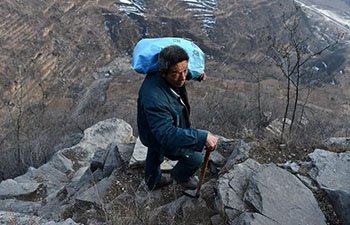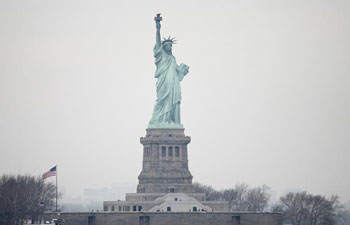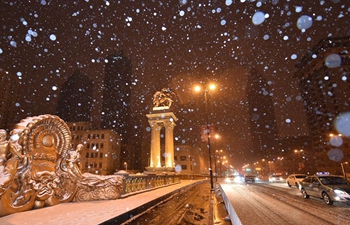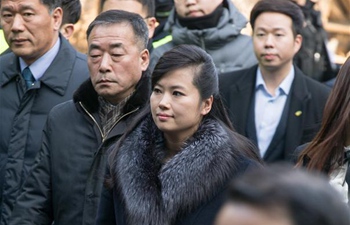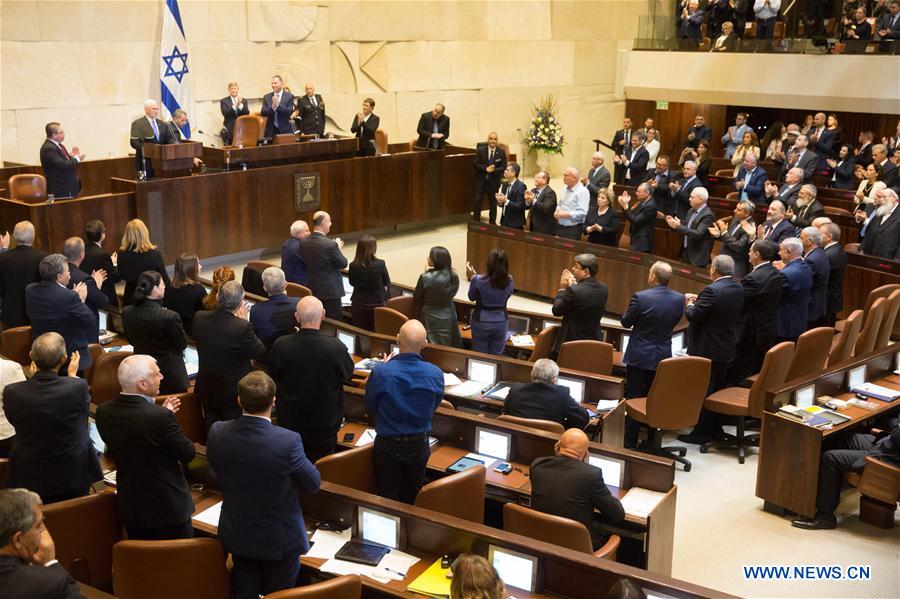 ?
?U.S. Vice President Mike Pence (2nd L, Rear) speaks at a special plenary session at the Knesset in Jerusalem, on Jan. 22, 2018. U.S. Vice President Mike Pence addressed the Knesset, Israel's parliament, on Monday, giving a strong pro-Israeli speech and promising the controversial relocation of the U.S. embassy from Tel Aviv to Jerusalem would be completed in less than two years. (Xinhua/JINI/Emil Salman)
JERUSALEM, Jan. 22 (Xinhua) -- U.S. Vice President Mike Pence addressed the Knesset, Israel's parliament, on Monday, giving a strong pro-Israeli speech and promising the controversial relocation of the U.S. embassy from Tel Aviv to Jerusalem would be completed in less than two years.
Lawmakers with the Arab-Jewish Joint List were escorted out of the plenum hall after they pulled out posters with a caption reading "Jerusalem is the capital of Palestine" and a photo of East Jerusalem's al-Aqsa mosque compound.
The Joint List, Israel's third largest faction, said in advance that it will boycott Pence's speech to protest the White House's recognition of Jerusalem as Israel's capital.
The address, which took place on the second day of Pence's visit in Israel, was interrupted also by repeated standing ovations.
It marked the first time that a vice president has addressed the Knesset and was broadcast on all main television and radio channels in Israel.
"I am here to convey a simple message from the heart of the American people: The American people stand with Israel," Pence said, as lawmakers and hundred guests in the hall stood and applauded him.
"Thanks to the president's leadership, the alliance between our two countries has never been stronger," Pence said.
He reiterated U.S. President Donald Trump's recognition of Jerusalem as the capital of Israel and vowed that the controversial move of relocating the U.S. embassy to Jerusalem would be completed before the end of 2019.
He said Trump has already instructed the State Department to "immediately" start to carry out the needed arrangments.
He then recited a short Jewish blessing from the Bible in Hebrew, as the audience responded with another round of standing ovation.
Addressing the long-stalled peace talks between Israel and the Palestinians, whose leaders will not meet with Pence in the wake of the White House Jerusalem statement, Pence said the U.S. is "strongly urging the Palestinian leadership to return to the table."
"Peace can only come through dialogue," he said.
He noted that "the United States will never compromise the safety and security of the state of Israel," adding that any peace deal "must guarantee Israel's ability to defend itself."
He said he has arrived in Israel after visiting Egypt and Jordan over the weekend, where he met with Egyptian President Abdel Fattah a-Sisi and King Abdullah II.
He said he discussed with the Arab leaders "remarkable transformation that is taking place across the Middle East today," without elaborating.
Pence also addressed the nuclear deal with Iran, referring the 2015 deal between Iran and the six world powers, as "a disaster."
He reiterated the recently-adopted White House stance that Washington will no longer certify the deal. "Unless the Iran nuclear deal is fixed, President Trump has said the United States will withdraw from the Iran nuclear deal immediately," he said.
He accused Iran of supporting "terrorist groups on Israel's doorstep" and "the leading state sponsor of terror." He said that the U.S. will work "with Israel "to confront Iran" and "will never allow Iran to acquire a nuclear weapon."
Turning his remarks to the "the proud and great people of Iran," Pence said their "day of liberation" is coming soon. He said that replacing the current regime would allow "the friendship between our peoples blossom once again."
Pence arrived in the region amidst heightened tensions in the wake of Trump's statement on December 6, which was denounced by the Palestinians and other countries.
Israel seized East Jerusalem in the 1967 Middle East war and annexed it shortly after, claiming it as part of its indivisible capital. The move, however, has never been recognized internationally.





